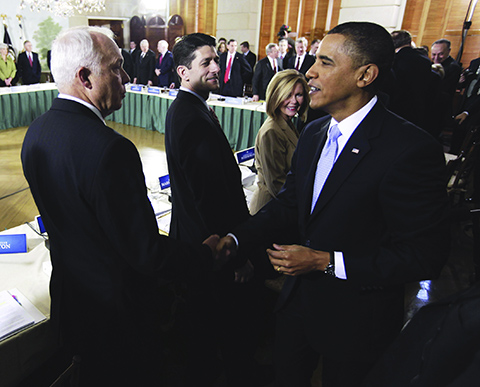 FILE - In this Feb 25, 2010, file photo, President Barack Obama, right, shakes hands with Rep. John Kline, R-Minn., at Blair House in Washington before the health care summit. From left, are, Kline, Rep. Paul Ryan, R-Wis., Rep. Marsha Blackburn, R-Tenn. and the president. For years, Obama and newly-elected House Speaker Ryan have been political foes and occasional policy allies. (AP Photo/Pablo Martinez Monsivais, File)
FILE - In this Feb 25, 2010, file photo, President Barack Obama, right, shakes hands with Rep. John Kline, R-Minn., at Blair House in Washington before the health care summit. From left, are, Kline, Rep. Paul Ryan, R-Wis., Rep. Marsha Blackburn, R-Tenn. and the president. For years, Obama and newly-elected House Speaker Ryan have been political foes and occasional policy allies. (AP Photo/Pablo Martinez Monsivais, File)
WASHINGTON: For years, US President Barack Obama and newly-elected House Speaker Paul Ryan have been political foes and occasional policy allies. Obama has long admired Ryan's seriousness on fiscal issues, but pilloried the Wisconsin lawmaker and GOP vice presidential nominee during the 2012 campaign as the architect of "radical" budget proposals. Ryan helped champion Obama's trade agenda this year, but also has been among the sharpest critics of the president's healthcare law.
Now, with Ryan at the helm of the fractious House Republican caucus, the two men face an uncertain 14-month stretch before the end of Obama's presidency. Ryan is eager to unify his party, but even if he can, there's no guarantee the House would make progress on Obama's priorities, including infrastructure spending and tax reform. "While it is certainly our hope that we can work together on areas of agreement, right now it's an unknown," White House communications director Jennifer Psaki said. "That has less to do with the individual and everything to do with the politics in the Republican caucus."
Still, there's no doubt that Ryan was the White House's favored choice for speaker after John Boehner resigned and No. 2 Republican Kevin McCarthy withdrew from the race to succeed him. Aides say the president views Ryan as a policy wonk driven more by legislative results than appeasing GOP hardliners. As Ryan addressed Congress Thursday, he said, "Let's be frank: The House is broken. We are not solving problems. We are adding to them."
Obama and Ryan enter this new phase of their relationship with few personal ties. They're close in age (Obama is 54, Ryan is 45), are fathers to school age children (two for Obama and three for Ryan), and are avid sports fans (though Obama's Chicago Bears and Ryan's Green Bay Packers are archrivals). But aides to both men say they've never spent much one-on-one time together. Obama and Ryan have spoken by phone occasionally, including during a key trade vote in Congress earlier this year. The president called Ryan Wednesday to wish him well in his new post, but the White House said they did not make plans to get together for a more extensive conversation.
Personal Relationships
The president has long bristled at the notion he would have had more success dealing with Republicans had he spent more time cultivating personal relationships. He and Boehner were cordial, though hardly close during the Ohio lawmaker's nearly five years as speaker. They made an attempt at forging deeper ties - and a grand budget bargain - with a well-publicized golf outing in 2011, but the budget talks fell apart and the two men were never again seen on the links.
White House aides hope Ryan can figure out what Boehner never seemed able to do: Bring the small, but vocal, conservative wing of the House caucus along on major issues - or moving on without them if they hold firm. White House aides point to Ryan's work on a 2013 budget deal with Democratic Sen Patty Murray as a sign of his willingness to reach across the aisle, even when it's unpopular with a swath of House Republicans. They've also welcomed his vocal support for the president's pursuit of the Trans Pacific Partnership trade pact.
When Ryan was asked earlier this year about aligning himself with a top presidential priority, he told CNN, "It doesn't bother me that the person I ran against in 2012 is the person I'm working with on this because it's the right thing for the country." Despite these areas of common interest, the most notable exchanges between Obama and Ryan have come when they've been at odds.
During a televised health care summit in 2010, Ryan derided the president's health care legislation as rife with "gimmicks and smoke and mirrors" techniques to shade the real cost. His detail-rich, six-minute commentary was praised by Republicans as among the most effective arguments against the "Obamacare" bill. In 2011, Obama castigated Ryan's budget proposals during a fiscal policy speech - with the Wisconsin lawmaker sitting in the front row. Without mentioning Ryan by name, Obama said the budget blueprint he authored painted "a vision of our future that is deeply pessimistic."
The president again used Ryan's budget as a political tool in the 2012 election after GOP nominee Mitt Romney tapped the House member as his running mate. Romney was sitting in the House chamber Thursday as Ryan officially became speaker, a visual reminder of Republicans' loss to Obama in the last presidential election. At the White House, Obama spokesman Josh Earnest also reminded Ryan that with Democrats still in the White House, most successful legislation has to be bipartisan. The president, Earnest said, hopes Ryan leads the House "with that fact in mind." - AP
.jpg)



